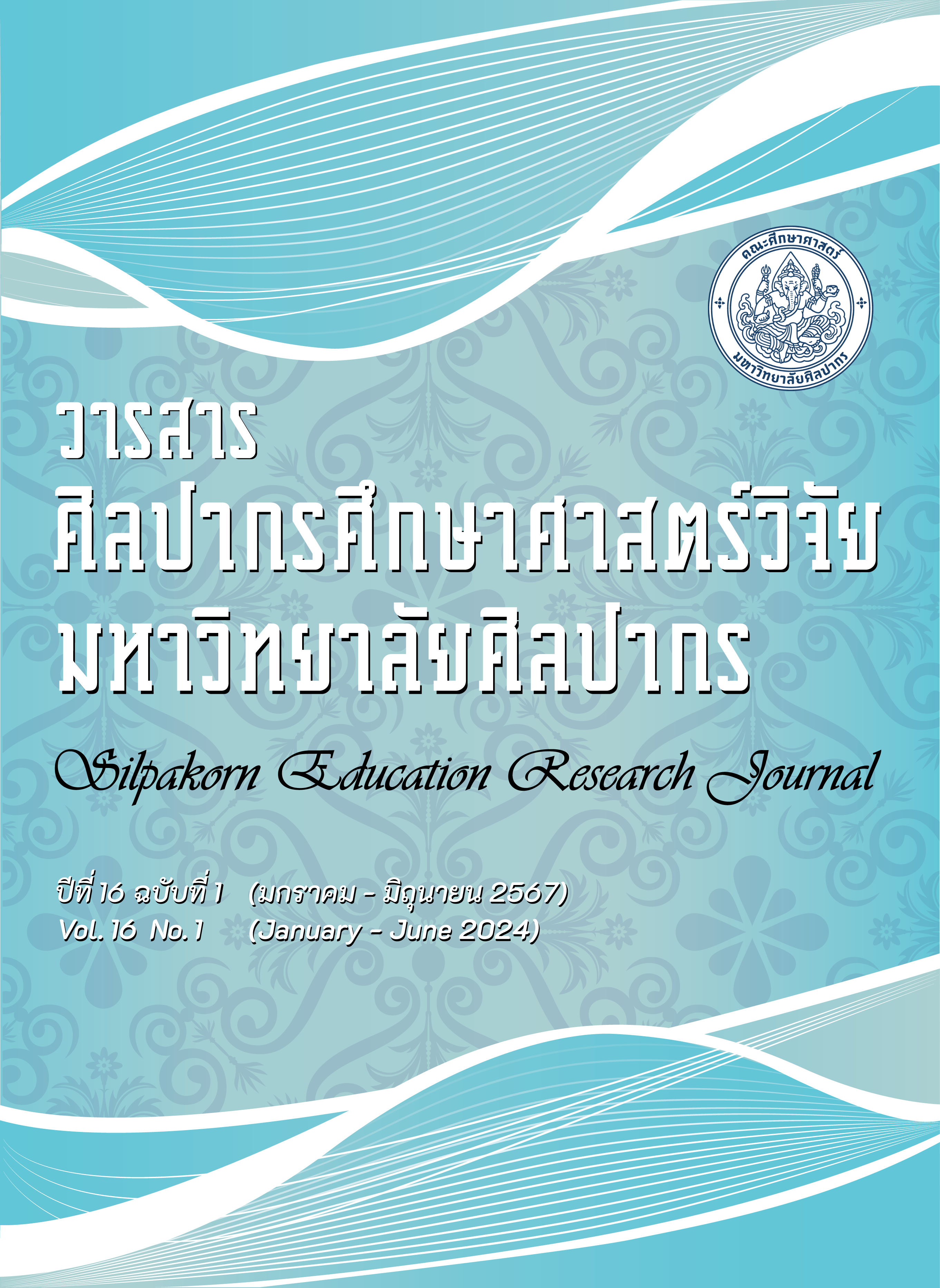การพัฒนาการจัดการเรียนรู้ที่เน้นการสืบสวนและตีความทางประวัติศาสตร์ เพื่อส่งเสริมการคิดทางประวัติศาสตร์สำหรับนักศึกษาสาขาสังคมศึกษา
คำสำคัญ:
การสืบสวนทางประวัติศาสตร์, การตีความทางประวัติศาสตร์, การคิดทางประวัติศาสตร์บทคัดย่อ
การวิจัยครั้งนี้มีวัตถุประสงค์เพื่อ 1) พัฒนากิจกรรมการจัดการเรียนรู้ที่เน้นการสืบสวนและตีความทางประวัติศาสตร์เพื่อส่งเสริมการคิดทางประวัติศาสตร์ของนักศึกษาสาขาสังคมศึกษา 2) เพื่อศึกษาผลการใช้กิจกรรมการจัดการเรียนรู้ที่เน้นการสืบสวนและตีความทางประวัติศาสตร์เพื่อส่งเสริมการคิดทางประวัติศาสตร์ของนักศึกษาสาขาสังคมศึกษา แบ่งเป็น 2.1) ศึกษาความสามารถในการคิดทางประวัติศาสตร์ของนักศึกษาสาขาสังคมศึกษา 2.2) เปรียบเทียบความสามารถในการคิดทางประวัติศาสตร์ของนักศึกษาสาขาสังคมศึกษาก่อนและหลังการใช้กิจกรรมการจัดการเรียนรู้ที่เน้นการสืบสวนและตีความทางประวัติศาสตร์เพื่อส่งเสริมการคิดทางประวัติศาสตร์ และ 2.3) ศึกษาความคิดเห็นของนักศึกษาสาขาสังคมศึกษาต่อกิจกรรมการจัดการเรียนรู้ที่เน้น การสืบสวนและตีความทางประวัติศาสตร์เพื่อส่งเสริมการคิดทางประวัติศาสตร์ กลุ่มตัวอย่างที่ใช้ในการวิจัยเป็นนักศึกษาระดับปริญญาตรีชั้นปีที่ 2 สาขาวิชาสังคมศึกษา คณะศึกษาศาสตร์ มหาวิทยาลัยศิลปากร จำนวน 45 คน ภาคการศึกษาปลาย ปีการศึกษา 2564 เครื่องมือที่ใช้ในการวิจัยประกอบด้วย แผนกิจกรรมการจัดการเรียนรู้ที่เน้นการสืบสวนและตีความทางประวัติศาสตร์ แบบประเมินการคิดทางประวัติศาสตร์ และแบบสอบถามความคิดเห็นของผู้เรียนที่มีต่อกิจกรรมการจัดการเรียนรู้ที่เน้นการสืบสวนและตีความทางประวัติศาสตร์ มีการวิเคราะห์ข้อมูลโดยการหาค่าเฉลี่ย ค่าเบี่ยงเบนมาตรฐาน ค่าทีแบบไม่เป็นอิสระ และการวิเคราะห์เนื้อหา
ผลการวิจัย พบว่า 1. กิจกรรมการจัดการเรียนรู้ที่เน้นการสืบสวนและตีความทางประวัติศาสตร์เพื่อส่งเสริมการคิดทางประวัติศาสตร์ มี 4 องค์ประกอบ คือ หลักการ วัตถุประสงค์ กระบวนการจัดการเรียนรู้ และเงื่อนไขการนำรูปแบบไปใช้ ซึ่งกระบวนการจัดการเรียนรู้ มี 4 ขั้นตอน ประกอบด้วย ขั้นที่ 1 อภิปรายประเด็นความรู้เพื่อตั้งคำถามทางประวัติศาสตร์ที่สนใจศึกษา ขั้นที่ 2 สำรวจและรวบรวมข้อมูลหลักฐานทางประวัติศาสตร์ในประเด็นที่ศึกษา ขั้นที่ 3 วิเคราะห์ตีความข้อมูลจากบริบททางประวัติศาสตร์ ขั้นที่ 4 สังเคราะห์และนำเสนอข้อมูลเชิงสาเหตุและผลกระทบโดยอ้างอิงหลักฐานทางประวัติศาสตร์ และมีการรับรองกิจกรรมการเรียนรู้ ฯ โดยผู้เชี่ยวชาญ
เอกสารอ้างอิง
American Historical Association of California State University. (2007). Five C’s of Historical Thinking. [Online]. Retrieved February 15, 2022, from https://www.historians.org/ research-and-publications/perspectives-on-history/january-2007/what-does-it-mean-think-historically
Barton, K. C. and Levstik, L. S. (2003). “Why Don't More History Teachers Engage Students in Interpretation?”. Social Education 67(6): 358-358.
Berg, C. W. (2019). “Why Study History? An Examination of Undergraduate Students’ Notions and Perceptions about History”. Historical Encounters 6(1): 54-71.
Best, J. W. and Kahn, J. (1986). Research in Education (4th ed). Delhi: Prentice-Hall of India. Pvt. Ltd.
Brown, S. D. (2009). “History Circles: The Doing of Teaching History”. The History Teacher 42(2): 191-203.
Chapman, A. (2011). Understanding Historical Knowing: Evidence and Accounts In the Future of the Past: Why History Education Matters. Nicosia: AHDR.
Chuto, S. (1984). “History” In Philosophy of History. Bangkok: Foundation for the Social Sciences and Humanities Textbook Project. (in Thai)
Creswell, J. W. and Clark, V. L. P. (2011). Designing and Conducting Mixed Methods Research. (2nd ed). Thousand Oaks, CA: Sage.
Eosriwong, N. (1984). “History and Historical Research”In Philosophy of History. Bangkok: Foundation for the Social Sciences and Humanities Textbook Project. (in Thai)
Fallace, T. D. (2007). “Second Graders Thinking Historically: Theory into Practice”. Journal of Social Studies Research 32(1): 44-53.
Fillpot, E. (2012). “Historical Thinking in the Third Grade”. The Social Studies 103(5): 206-217. [Online]. Retrieved March 1, 2022, from https://doi.org/10.1080/00377996.2011.622318
Hicks, D. and Doolittle, P. E. (2008). “Fostering Analysis in Historical Inquiry Through Multimedia Embedded Scaffolding”. Theory and Research in Social Education 36(3): 206-232. [Online]. Retrieved March 1, 2022, from https://doi.org/10.1080/00933104.2008.10473373
Hantrakool, P. (2013). “Teaching Technique and Using Teaching Innovation in History”. In History, Religion, Culture, and Education: A Collection of Thai Studies Articles to Recall Professor Ishii Yoneo. Edited by C. Natsupa and C. Soontravanich. Bangkok: Dansutta Printing. (in Thai)
Hongphanut, R. (2008). “Competencies of History Teachers in an Era of Change”. Journal of Education Studies 37(1): 215-228. (in Thai)
Jones, A. (2011). “Teaching History at University Through Communities of Inquiry”. The Australia Historical Studies 42(2): 168-193. [Online]. Retrieved February 15, 2022 from https://doi.org/10.1080/1031461X.2010.531747
Keirn, T. and Luhr, E. (2012). “Subject Matter Counts: The Pre-Service Teaching and Learning of Historical Thinking”. The History Teacher 45(4): 493-511. [Online]. Retrieved February 15, 2022, from https://www.jstor.org/stable/23265942
Lazar, S. (2011). Teaching History Through Inquiry. [Online]. Retrieved February 12, 2022, from https://www.edweek.org/teaching-learning/opinion-teaching-history-throughinquiry/2011/ 11
Lesh, B. A. (2011). “Interpreting John Brown: Infusing Historical Thinking into the Classroom”. OAH Magazine of History 25(2): 46-50. [Online]. Retrieved February 15, 2022, from https://doi.org/10.1093/oahmag/oar003
Levstik, L. S. and Barton, K. C. (2011). Doing History: Investigating with Children in Elementary and Middle Schools. New York: Routledge.
Monte-Sano, C. (2011). “Beyond Reading Comprehension and Summary: Learning to Read and Write in History by Focusing on Evidence, Perspective, and Interpretation”. Curriculum Inquiry 41(2): 212-249. [Online]. Retrieved February 15, 2022, from https://doi.org/10.1111/j.1467-873X.2011.00547.x
National Center for History in the Schools. (1996). National Standards for History; Core Components of Historical Thinking. [Online]. Retrieved February 15, 2022, from http://www.nchs.ucla.edu/history-standards/historical-thinking-standards
Nillapun, M. (2012). Research Methodology in Education. Nakhon Pathom: Faculty of Education, Silpakorn University. (in Thai)
Numnon, T. (1984). “History”. In Philosophy of History. Bangkok: Foundation for the Social Sciences and Humanities Textbook Project. (in Thai)
Phakprot, R., Tosakul, M. and Jankloy, M. (2013). Learning about Sukhothai History through Virtual Field Trip Media. Bangkok: Office of Academic and Educational Standards. (in Thai)
Phongsripian, W. (2000). Handbook for Organizing History Teaching Activities: How to Study History and How to Teach It. Bangkok: Religious Printing House. (in Thai)
Rae, C. S. (2007). Student as Historians: The Historical Narrative Inquiry Model’s Impact on Historical Thinking and Historical Empathy. Doctor of Philosophy Thesis Program in Curriculum and Instruction Department of Teacher Education and Administration University of North Texas, USA.
Retz, T. (2016). “At the Interface: Academic History, School History and The Philosophy of History”. Journal of Curriculum Studies 48(4): 503-517. [Online]. Retrieved February 15, 2022, from https://doi.org/10.1080/00220272.2015.1114151
Roy Rosenzweig Center for History and New Media. (2011). What is Historical Thinking? [Online]. Retrieved February 15, 2022, from https://teachinghistory.org/nhec-blog/24434
Rosenzweig, R. and Wineburg, S. (2008). Historical thinking Matters. [Online]. Retrieved February 15, 2022, from https://historicalthinkingmatters.org/ted/lessons/making
Seixas, P. (2006). Teacher Notes: Benchmarks of Historical Thinking a Framework for Assessment in Canada. [Online]. Retrieved February 15, 2022, from https://www.edu.gov.mb.ca/k12/cur/socstud/foundation_gr8/tns/tn1.pdf
_______. (2017). “A Model of Historical Thinking”. Educational Philosophy and Theory 49(6): 593-605. [Online]. Retrieved February 15, 2022, from https://doi.org/10.1080/00131857.2015.1101363
Sheehan, M. (2013). Better to Do than Receive”Learning to Think Historically through Internally Assessed Course Work. [Online]. Retrieved February 15, 2022, from http://www.tlri.org.nz/sites/default/files /projects/Sheehan_Summary %20web%20 ready%20(v6).pdfhinking
Talin, R. (2015). “Historical Thinking Skills – The Forgotten Skills?”. International Journal of Learning and Teaching 7(1): 15-23.
Tuckman, B. W. (1999). Conducting Educational Research. (5th ed). New York: Wadsworth.
Viator, M. G. (2012). “Developing Historical Think Through Question”. The Social Studies 103 (5): 198-200.
Wineburg, S. (2001). Historical Thinking and Other Unnatural Acts: Charting the Future of Teaching the Past. Philadelphia: Temple University Press.
Wineburg, S., Reisman, A. and Fogo, B. (2007). “Historical Evidence and Evidence of Learning”. International Journal Social Education 22(1): 146-156.
Wood, T. (2013). Professional Development in Historical Inquiry: Exploring Changes in Two Social Studies Teachers' Knowledge, Beliefs, and Practices. Doctor of Education Thesis Program in Feinstein School of Education and Human Development University of Rhode Island.





